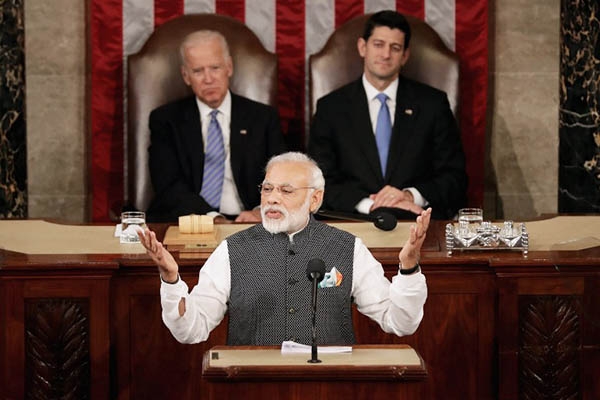
Chip Somodevilla—AFP
During address to joint session of U.S. Congress, Indian premier asks lawmakers to help isolate terror supporters in ‘India’s neighborhood.’
Prime Minister Narendra Modi declared Wednesday that India and the United States should work together more closely to defeat terrorism and head off regional instability. While the Indian leader did not mention Pakistan by name, Modi urged U.S. lawmakers to help isolate those who support terrorism that is “incubated in India’s neighborhood.”
And, while he did not address China’s maritime territorial ambitions, Modi said a U.S.-India partnership would “help ensure security of the sea lanes of commerce and freedom of navigation.”
Modi made the remarks in an address to a joint session of the U.S. Congress during a visit to Washington designed to build on improved ties between the world’s two largest democracies. Once effectively banned from the United States because of his alleged role in anti-Muslim riots before coming to national office, Modi has built a rapport with U.S. President Barack Obama.
Now, with Obama’s final term coming to an end in seven months, the two partners are keen to secure support for India’s civil nuclear program and build an enduring great power partnership.
Modi said Indian independence leader Mahatma Gandhi had inspired U.S. civil rights hero Martin Luther King and that both countries had been inspired by their “struggle for freedom.”
“No wonder then, that former Prime Minister of India Atal Bihari Vajpayee called India and the U.S. ‘natural allies’,” he told the U.S. lawmakers. “No wonder then, that President Obama has called our ties the defining partnership of the 21st century,” he added.
India has a tradition of shunning formal alliances and relations with the United States were strained in the past by Cold War tensions. Modi was also still careful to paint the relationship as one of equals, stressing that Obama supports Delhi’s bid to become a permanent member of the U.N. Security Council.
But he was keen to play up for his Washington audience the more than $10 billion India has spent on U.S. weaponry in the past five years—and its role in securing regional stability. “A strong India-U.S. partnership can anchor peace, prosperity and stability from Asia to Africa and from Indian Ocean to the Pacific,” he declared.
While not formally adopting the role of a U.S. military ally, India has helped international rescue foreign nationals from war-torn Yemen and in anti-piracy operations off Somalia.
Modi also suggested that Delhi would be a positive influence as Washington seeks to defuse a confrontation with China over its territorial claims in the South China Sea. But he also pointedly urged his new U.S. friends to see India’s long standoff with neighboring Pakistan through the prism of Islamabad’s alleged history of support for Islamist extremism.
He thanked Congress for what he said was its support when “terrorists from across our border” launched the Mumbai attacks in November 2008. “Globally, terrorism remains the biggest threat,” he argued before the body that must authorize American arms sales to Pakistan. “In the territory stretching from west of India’s border to Africa, it may go by different names, from Laskhar-e-Taiba, to the Taliban to ISIS.”
Lashkar-e-Taiba is a Pakistani-based group blamed for attacks inside India, the Afghan Taliban use safe havens in Pakistan and ISIS, or the so-called Islamic State, has opened a South Asian affiliate.
Modi’s speech, coming a day after a successful visit to the Democratic president in the White House, was warmly received by Republican leaders in Congress. Senate Majority Leader Mitch McConnell agreed the visit was an opportunity to hear Modi’s view “on India’s economic growth and how he feels we can strengthen the strategic partnership between our countries.”
After giving his address, Modi was to be hosted for lunch by House majority leader Paul Ryan and then attend a reception organized by Congressmen for 500 dignitaries. “He spoke eloquently about the importance of a strong U.S.-India relationship to promoting peace and freedom around the globe,” Ryan said.
During his three-day visit he has also met U.S. and Indian business leaders—and has already secured a promise of $3 billion in investment by online retailer Amazon.

1 comment
It is high time big brother ( India) & younger brother (Pakistan)understand each other & live in perfect harmony , with what ever their father( British) gave them in Partition, & set an example for rest of the world , how 2 brothers live in their own homes. Both brothers should accept the share they got from their honble father. When 2 brothers got their share, where is the option to kill each other.